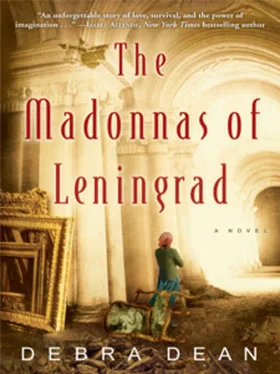Marina says to Tamara, “She looks a little as though she could see into the future.”
“Hmm? Who’s that?” Dmitri, unaccountably, is standing at the window of their bedroom, holding up a blue dress, fingering the collar.
“The Lady in Blue. The Gainsborough painting.”
“We’d better finish getting dressed. Elena will be here any minute.”
“Where are we going?”
“Katie’s wedding.”
“Yes, of course.” She turns away from Dmitri and begins to fish around in her jewelry box. A wedding, so she should dress up. She will wear her mother’s…the things that hang from ears. She can picture them quite clearly but can’t find the word. Neither can she find the objects themselves. She could ask Dmitri where they’ve gotten to, but first she needs the word. Her mother’s…what? They are filigreed gold with little rubies. She can picture them, but there is no word with the picture, not in English or in Russian.
She knows what is happening to her; she is not a fool. Something is eating into her memory. She caught the flu (last winter? two winters ago?) and nearly died. She who had prided herself on never being sick, who survived the starvation winter, was too weak to stand. Dmitri found her at the foot of the bed, collapsed. She lost whole days, a blank week, and when she returned to the living, she was changed.
This is her explanation. There is another. After Dmitri found her pocketbook in the oven, they went to a doctor and he asked her questions. It was like taking her exams at the art academy again, calling up answers to a barrage of random queries posed by her professors. Name the major artists of the Florentine school and several of their works, including the dates and provenances. What is today’s date? Describe the technical processes and materials used in the creation of fresco. I’m going to name three objects and I want you to repeat them back to me: street, banana, hammer. Identify which of the following works are now in the permanent collection of the State Museum of Leningrad and which are in Moscow at the Fine Arts. I’d like you to count backwards from one hundred by seven. Can you repeat back to me the three objects I mentioned a moment ago?
She passed her exams with distinction. But the doctor, though kind, was not impressed. He explained that she is elderly and her confusion is one of those unfortunate but not uncommon alterations that come with old age. She and Dmitri were given a packet of materials and a sheaf of prescriptions and counseled that patience and vigilance was their best course.
Because she sometimes forgets to turn off the burners, she uses the stove now only if Dimitri is present, and then only to heat water for tea. Even the dishes she knows by heart have ended up ruined so often, a cup of flour missing or something mysterious added, that she rarely cooks anymore. Dmitri has assumed most all her jobs, not only the cooking but the marketing and the washing as well. And then there is a girl who comes in and cleans, though this is almost more than Marina can bear. She tries to help the girl, or at least to make her tea, but the girl insists that she was hired to do a job and Marina should just relax. “Just put up your feet and be a queen,” the girl urges. “That’s what I’d do.” Marina tries to explain that no one should be idle, spitting at the ceiling while others work for her, but it’s no use. They have finally reached a compromise in which the girl allows her to dust.
Dmitri has laid out her clothes on the bed: a pair of slacks, a knit top, and a sweater.
She doesn’t want to criticize him, but she feels sure that this is too casual. Dmitri has never had a sure sense of the right thing to wear. Left to his own devices, he might pair brown slacks and a red checked shirt with black dress shoes. She never went so far as to lay out his clothes, but she would make discreet suggestions, steering him to another tie or telling him how much she liked him in a particular shirt.
“Maybe I should wear a dress?” she asks.
“I guess you can if you wish, but I think this would be more comfortable. It’s a long drive.”
“And then we will change for the wedding?”
“The wedding is tomorrow. Today, we’re going to the island. Tonight, there’s a dinner to meet Cooper’s family.”
“I see.” She doesn’t see at all, but for the moment she will stop trying.
“Come on, darling, lift up,” he says. She raises her arms, and he tugs her nightgown up over her head. When her head reemerges, she sees a naked body reflected in the mirrored closet door. It is a shock, this withered old carcass. Most of the time, she doesn’t look. But when she does, this image she sees, while vaguely familiar, is not herself. It is a body she remembers, though, something about the mottled skin, pale as a fish and nearly translucent. The way the skin drapes loosely from the arms and knees. And the sagging, empty breasts. The pouching stomach. It is like the body she had during the first winter of the siege. That’s it. Some differences, of course. It is softer, for one thing, without the sharp bones. But it is as alien a creature as that other body. Mulish, too, resisting her will with the same indifference, as if it really did belong to someone else.
She steps gingerly into the underpants Dmitri holds at her feet. When he holds out her bra, she lifts each breast up and settles it into a cup. At her back, she feels his arthritic fingers struggling to connect hooks with eyes.
It occurs to her that she is probably as old as Anya, one of the Hermitage babushki. There was a fleet of old ladies on the staff at the Hermitage, mostly attendants who sat in the rooms, keeping an eye on the paintings and cautioning visitors not to touch the art. Anya was ancient. The old woman could recall the day Alexander II was assassinated, and would tell Marina fantastic stories about the parties the empress held in the Winter Palace. Anya was a remnant of the old capitalist world, a time that had seemed to Marina as far in the past as ancient Greece. Now, reconsidering, she thinks it may have been only some thirty or forty years before her own birth, not long at all, really.
“When was Alexander the Second killed?”
“Oh, for…I don’t know, Marina.” She hears the flash of irritation in her husband’s voice. He is still grappling with her bra. She must try to stay present.
“They don’t all of them have to be closed,” she tells him.
“I’ve almost got it.” His face is hidden behind her back so she can’t see his expression, but she doesn’t need to. When he concentrates like this, he chews his lower lip.
“What shall we eat for lunch?” she asks brightly.
“Elena is picking us up. Then we’re driving up to Anacortes. We’ll eat something on the ferry, probably.”
“Yes, I know,” she lies. “But we might want to make sandwiches to take.”
He snaps her bra strap triumphantly and rises up, appearing in the mirror behind her. He, too, has been transformed, her handsome young husband replaced by this elderly, white-haired man. It’s as though his face has melted, puddles of loose skin forming under his eyes, the once firm jaw dripping into wattles. His ears are as long as a hound’s.
“Okay, what’s next? Top. Arms up, missus.” She raises her arms again and they both disappear.
Here we are, the Hall of French Art. The room is delicate as a suspended breath, the pale dove-colored walls curving under neoclassical vaults, the inlaid floors a minuet of repeating circles and turns. And over here, against the long wall, is a young girl in a beautiful heavy satin gown. In the shadows, half-hidden behind a door, is her young man, and he is kissing her cheek. Though she hasn’t seen us yet, like a deer she is alert, listening intently, expecting to be interrupted at any moment by the women in the next room. The girl is poised to flee. The long, sinuous line of her torso stretches away from the delicate contact of the kiss, through her outstretched arm, and then evaporates into the transparent folds of a scarf.
Читать дальше












